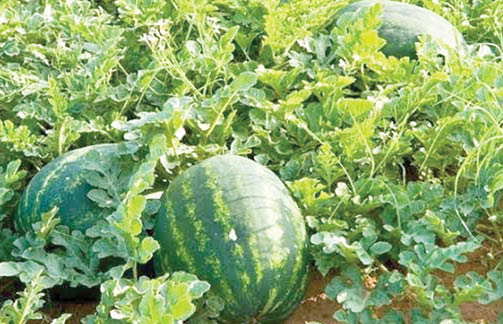Little was known about watermelon farming in Benue State until recently when the crop began gaining popularity even in rural areas of the “Food Basket of the Nation”.
Vitalis Tarnongu, a big time farmer who had excelled in the production of rice, yam, maize, cowpea, soybean, among others, has delved into commercial watermelon farming for income generation.
He told our correspondent that watermelon in his field located around the University of Agriculture in Makurdi recently yielded abundantly, an indication that watermelon farming was worthwhile.
Tarnongu said a lot of opportunities abound in watermelon farming, adding that there were still challenges, especially with ready markets, and that its prospects were quite overwhelming, with its duration being very short as a farmer could cultivate it more than once yearly.
“There is very high prospect as this farm fruit is capable of yielding over N1.5m profit on one acre per year. Since it can be done thrice in a year; there is regular income, and its export potential is equally high.
“The bits of challenges include lack of market sometimes, lack of quality seeds, problem of pest and inadequate capital to scale up production,” he said.
According to him, many farmers in the state are not going into farming the fruit crop because they lack knowledge about its economic viability, lack of quality seeds, as well as pest and insects.
He noted, however, that depending on a farmer’s location, most of the fruit crops such as watermelon did not require much water so one could always crop them whenever there was moisture in the soil.
“For a small-holder farmer venturing into the cultivation of this crop, he can start immediately rain starts and can even crop them after first harvest; making it two times a year. But one can also install irrigation facilities to increase the number of circles per year.
“A lot of market is available for the fruit both locally and internationally, especially if one grows them organically,” he explained.
Tarnongu admitted that watermelon farming was now the quickest means of becoming a millionaire for serious minded young farmers, stressing that, “With a small farm space as small as one plot of 100×100 one can make a profit of over N1.5m within one year of three cycles cultivation of watermelon, especially now that there is some level of awareness of its health advantages and other benefits.
“I have cultivated only six hectares for this dry season’s irrigation due to lack of irrigation facilities. The yield is impressive, and I’m looking forward to a bumper harvest.
“Good agronomy practices cost over N215,000 per hectare and there is a tendency of generating over N600,000 in return per hectare,” he further said.
Another watermelon farmer, Phillip Terzungwe Agoon (40) will not trade his watermelon farming for a white collar job which most young people of his age are scouting for in big cities across the country.
Mr Agoon said the decision was based on the fact that watermelon farming in Benue State had become the surest way to achieve a millionaire status in recent times.
“Watermelon farming is lucrative. I don’t think there is any farm produce that gives more money in Benue State right now like watermelon.
“Imagine, a truck of watermelon fetches a farmer in my village N1.5m. Interestingly, you farm less than a hectare to get the truckload of watermelon, and sometimes, it even fetches one more than that amount,” he said.
He pointed out that farmers in the state were just beginning to learn how to farm watermelon as in time past they did not actually give much attention to the fruit.
According to him, members of his family started farming watermelon some years ago and that on completion of his studies from Jos in Plateau State last year he decided to go into commercial cultivation of the fruit crop.
Agoon added that presently farmers in his locality were done with the harvest of the rainy season watermelon and were now harvesting the dry season plantations.
He further explained that the crop could be farmed twice in year, and therefore advised young people to go into its farming, especially if they were graduates and idling away due to lack of jobs, insisting that gone were the days when people looked down on farmers as the poorest in the society.
“For now, there is no place in Benue that you can find watermelon farming in commercial quantity like my village, Mbagundu in Iwarnyam Ward of Konshisha Local Government Area.
“We are already harvesting the dry season watermelon in my locality. This year’s rainy season harvest wasn’t as marketable as it used to be; that discouraged many farmers from planting as much quantity like they did before.
“But, the watermelon is still sellable despite the poor market we experienced for the rainy season produce. I planted only two hectares of watermelon for this dry season because I was also disappointed over the outcome of the rainy season yield.
“I plant much whenever the market is good. I decided to reduce the farm this dry season because watermelon plants require more chemical spraying which cost higher at this period to enable good yield.
“Despite the challenges experienced during the rainy season, those of us who planted watermelon for this dry season are however smiling. For me, the harvest of two hectares cultivated is far more than a lorry load,” Agoon explained.
Similarly, there other farmers from Konshisha LGA who corroborated Agoon.
One of such villagers, Terkimbi Stephen, attested to the fact that traders all the way from Plateau State were now coming to Mbagundu village to buy watermelon in trucks.
Stephen said that though many other areas in the state were getting popular for watermelon production, the climatic environment of Mbagundu village had been discovered to be favourable for the cultivation of the fruit.
Meanwhile, an expert at the University of Agriculture in Makurdi, Dr Teryima Iorlamen, said watermelon emphasised that farmers could grow them considering their nutritional value to the human body as they supplied vitamins, minerals and other micro nutrients.
“It should not be planted in soils that hold too much water. They should avoid water-logged areas. We also encourage irrigation farming. Their quality is better under irrigation than rain-fed,” Iorlamen maintained.
On his part, the Chairman of Fruit Farmers Association in the state, Atsaga Anemba, said among fruits gaining grounds in the state, members of his association planted more of watermelon.
“It grows well in the state. The harvest is bountiful in my home town of Lessel in Ushongo LGA. There is available market, some people take it to Gboko, Abuja and Jos. It has a lot of profit.
“And the one that grows here is very sweet. I will advise farmers to venture into watermelon farming because it’s lucrative, even more profitable during the rainy season,” he emphasised.
Anemba further said farming of watermelon had become more common in the state, noting that it could be planted in all seasons.
In the same vein, state Chairman of the All Farmers Association of Nigeria (AFAN), Aondongu Saaku, encouraged farmers in the state to key into watermelon production on a large scale because it would fetch them huge income.
“Seriously, it has profit because it yields a lot. It’s not as difficult as other crops. Even when we bring varieties from somewhere else, it will be better on our soil than the original place where they came from.
“We are even organising the farmers into an association to be known as Watermelon Association of Nigeria so that it will thrive and get more members,” he explained.

 Join Daily Trust WhatsApp Community For Quick Access To News and Happenings Around You.
Join Daily Trust WhatsApp Community For Quick Access To News and Happenings Around You.


